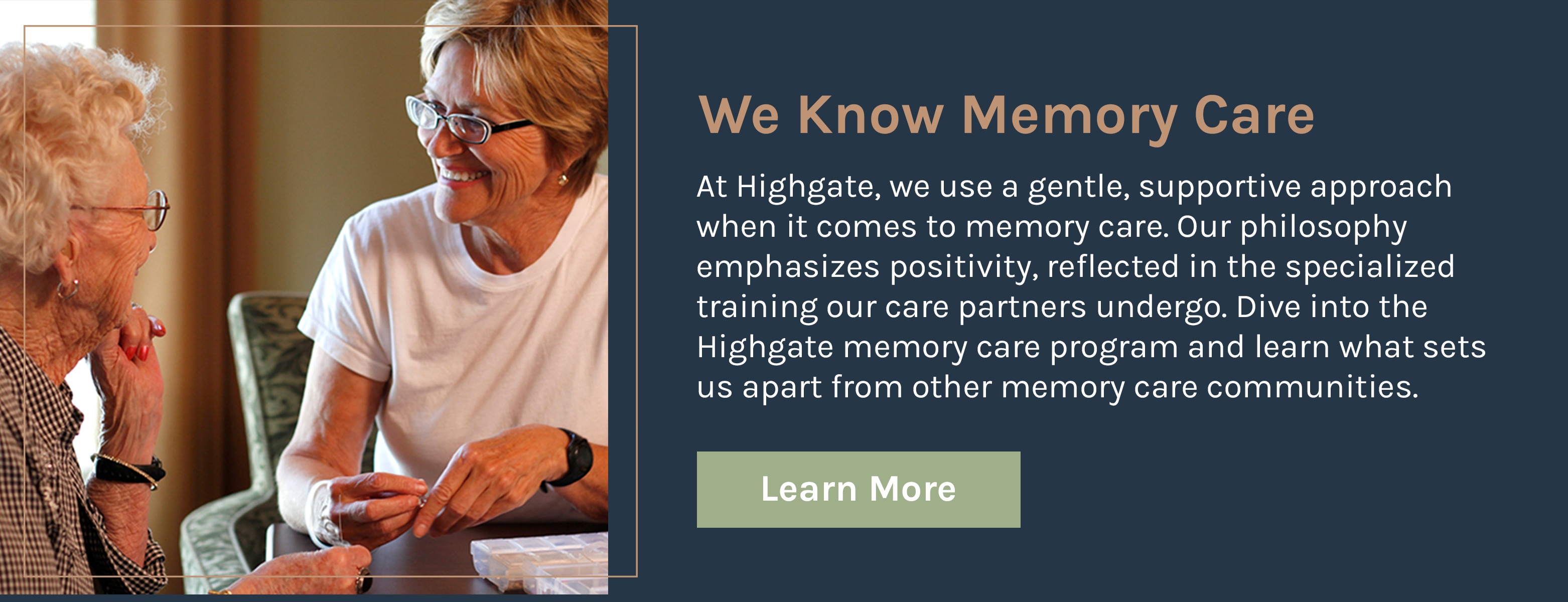 When your loved one moves into a memory care community, they’ll have the option of a private studio or a companion suite. Some families assume a studio will be the better option, but there are many reasons why companion suites are ideal for someone with memory loss.
When your loved one moves into a memory care community, they’ll have the option of a private studio or a companion suite. Some families assume a studio will be the better option, but there are many reasons why companion suites are ideal for someone with memory loss.
What Are Companion Suites?
Companion suites are a unique living option in many memory care communities. An alternative to private suites, companion suites bring two compatible seniors together to share an apartment.
Living with someone else in a companion suite is an easy way to reduce the cost of memory care. By saving money each month on the room, your loved one might be able to afford to live in a more desirable community than they would be able to afford if they’re paying for a private room.
Still, many families are leery: What if they don’t get along?
“It’s actually more common than you might think,” says Highgate at Flagstaff's Executive Director or 'ED'. “We have 20 rooms in memory care. Out of those, only eight of those are private. The rest are companions. It’s super common.”
Benefits of Companion Suites in Memory Care
Think about your loved one’s life. It’s likely that they spent most of their lives surrounded by people — parents, siblings, friends, spouses, children — and built strong relationships with them.
One of the most challenging aspects of the dementia disease process is that people in the early stages can start to withdraw and become isolated from these meaningful relationships. Often this starts as a way to avoid embarrassing moments that inevitably come with memory loss. As the disease progresses, the impact of this lack of stimulation and engagement can be devastating, leading to frustration, boredom, unexpected behaviors, and poor quality of life.
“People with dementia still want and need to be loved, understood, and valued,” the Executive Director says. “Having a companion in the community tends to help memory care residents live happier and healthier lives.”
Here’s why.
Eases the Transition
Like any major life change, moving to a new home takes some adjustment. When you bring two compatible seniors together to share an apartment, it makes transitioning into the new environment easier.
This is especially true for those who are naturally introverted. If your loved one isn’t the type who thrives on making new friends or being the life of the party, the move into memory care could be less traumatic if someone more outgoing by nature is paired with them.
Creates a Sense of Belonging
Residents who live in companion suites often encourage each other to participate in community activities, which further helps people with dementia to continue to engage and feel fulfilled, improving their quality of life.
One Highgate family member, Bev, shares her experiences moving her mother, Bonnie, into a companion suite: “We were convinced she wouldn't be OK with the companion suite. She didn’t like being with people. But after learning about the benefits, we gave it a try. It’s night and day. It’s changed her life in such positive ways. Another friend didn’t do a companion suite, and she's really struggling. She wants to go home. She’s angry.”
Companion living not only provides a sense of friendship for the residents, but it also allows their family and friends to build relationships and support one another in the caregiving journey.
Lessens Dementia Symptoms
Many seniors living with dementia experience behavioral and psychological symptoms, such as agitation, aggression, depression, delusions, hallucinations, and sleep disturbances. Living with a companion can sometimes ease these burdens.
For example, some people with dementia have problems sleeping and experience restlessness during the night. If there is someone else in the room, they often won’t get up and wander looking for somebody. They see someone in the other bed and it’s comforting to them. Residents in companion suites often have better sleep patterns because they have the sense that they are not alone.
Another Highgate family member, Lisa, shares her experience with her father, James, and his roommate, Tom. “One weekend Dad’s roommate got sick and had to go to the hospital, so he had the room to himself for a few days. Dad called me and told me he didn’t sleep well because he was all alone,” Lisa says. “Now when I go up there and I see Tom and Dad, Dad will tell me — every day — ‘That’s my roommate!’ He’s so happy to have that person.”
Companion Suites at Highgate at Flagstaff
Highgate at Flagstaff offers companion suites within its memory care community, known as The Cottage.
“When matching roommates, we make sure that residents are paired based on interests and life experiences,” Flagstaff's ED says. “We also consider compatibility factors like cleanliness values, tastes in music, common beliefs, and sleeping habits.”
The primary concern is to create an environment that fosters the well-being of each resident. If sharing a living space isn’t a good fit, the team works to find an affordable yet workable solution.
Although some families are reluctant to put their loved one in a companion suite, once the move to memory care is made, they often report dramatic changes — both in their loved one with dementia and in their own peace of mind.
Want to see what a companion suite at Highgate at Flagstaff looks like? Learn more about our memory care program today.





